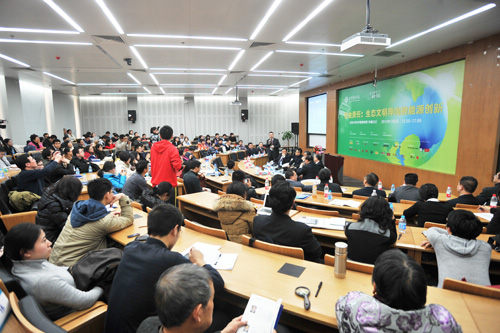
 |
| SEEKING SOLUTIONS: The energy innovation forum, a sideline of the New Year Forum of the Guanghua School of Management of the Peking University, was held in Beijing on January 6 (WEI YAO) |
Although its per-capita emission is roughly on par with the world's average, China is the world's largest carbon dioxide emitter, spawning a nationwide thirst for an expansion of its new energy sector, where it is already a world leader.
Facing increasing pressure from climate change brought about by fossil fuels, China has made it a national obsession to uncover the potential of new energy. It has carved out its own path to tackle climate change by creating ambitious targets in its five-year plans and making ecological progress part of its national development strategy.
"The trend of continuous growth in energy demands can't be altered," said Li Junfeng, Director of the National Climate Change Strategy Research and International Cooperation Center, on the sideline of the New Year Forum held by the Guanghua Management School of Peking University in Beijing on January 6.
"The only way forward is to enhance the efficiency of energy consumption through technological innovation, which can give us both a higher-quality life and a lower-carbon future," said Li.
"We should have the faith that better technology for the new energy sector, which can change the world, can be invented. This has been proven through countless examples during the past decade," said Yu Pingrong, professor at the School of Engineering of Peking University. "More innovation is needed in this sector."
Recycling carbon
De-carbonization has become a trend in China's energy sector as the country places more demands on companies to combat emissions. Compared with the exploitation of non-fossil fuel energy, which is unstable and costs more, a more realistic move for now is to eliminate carbon dioxide emission.
In 2009, Shenhua Group Corp. Ltd., the largest coal company in China and the world's largest coal supplier, established the National Institute of Clean-and-Low-Carbon Energy in Beijing, aimed at carbon capture and storage, which can lower the carbon emitted from burning coal.
"Trash is a misplaced treasure," said Huang Qing, Shenhua Group's Board Secretary. "Carbon dioxide is a key to the photosynthesis of plants. In the future, if human beings can benefit from the process, carbon dioxide will become a valuable resource."
Right now, there is no good way for dealing with carbon emissions. Over 500 research fellows at the National Institute of Clean-and-Low-Carbon Energy are researching ways to capture emitted carbon dioxide and store it for future use, he said.

















 'Sister House' case urges efforts in combating corruption in affordable housing
'Sister House' case urges efforts in combating corruption in affordable housing


![]()
